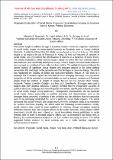Pragmatic Exploration of Social Media Images on Interpretation Aiming at Facebook Users in Kenya: Political Discourse
Publication Date
2020Author
Manyala A. Queenter ; Dr. Yakub Adams & Sr. Dr. Achieng A. Lucy
Metadata
Show full item recordAbstract/
This article sought to address the gap in empirical research related to pragmatic exploration
of social media images on interpretation focusing on Facebook users in Kenya: political
discourse. In order to achieve this, the article was anchored on Grice’s CI theory. The article
sought to (a) explore the use of Facebook in Kenya (b) find out functions of cartoons in
social media, and (c) examine the effectiveness of maxims as a backbone of Grice theory.
The article employed a mixed method research design in which the main methods used in
data collection was specifically descriptive survey; Content analysis of social media networks
was surveyed as a method of data collection from online. The analytical procedure followed the
content analysis of significant textual features and discourse patterns in the online political
conversation that sheds light on the persuasive use of technologies as discourse strategy. The article
thus highlighted the sociality of politics and socio-communicative features of Face book as a
campaign tool to mobilize support and woo listeners in an emerging democracy. The population
comprised of all the selected social media platforms such as tweeter, cartoons and Facebook
images form the internet. A sample of images focused on five popular SNSs namely,
Facebook, Twitter, LinkedIn, Google+, and face book. Specifically, 30 images were used to
analyze data from political discourse. Findings revealed that the independent variables of
political discourse, language and social linguistic interactions significantly influenced choice
of social media images among politicians. Demographic characteristics did not moderate
social media choice, personality in political discourse but characteristics such as the
messages being conveyed, of position of the politician and the criticisms that the cartoonists
seem to be portraying moderated the use of a particular social media network. The article
concluded that social network sites usage among Kenyan politicians needs to be harnessed
for positive outcomes. Equally, the article made the following recommendations. Firstly,
social network sites could be used positively in behavior change campaigns targeting
politicians because they have a higher affinity to the public. Secondly, policy makers within
government should take keen interest on social interactions among politicians in social
network sites in order to forestall negative effects such as recruitment into terror cells or
flouting the communicative principles or the four maxims according to Grice. The article
suggested further research in rural contexts and on a wider political segment of
communication on tweeter.

